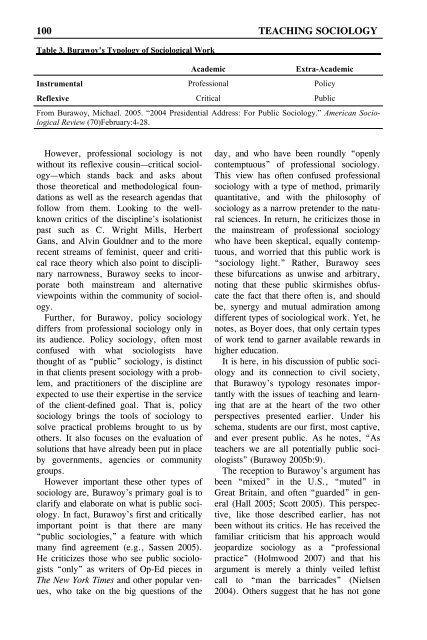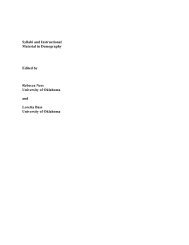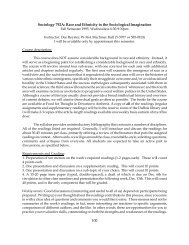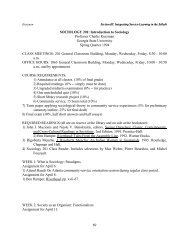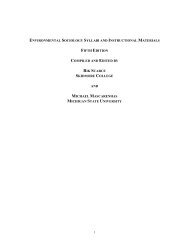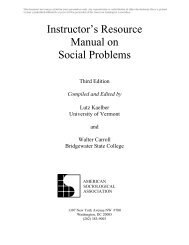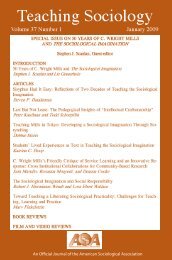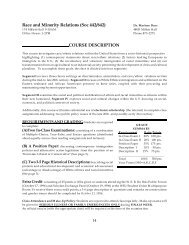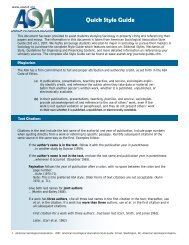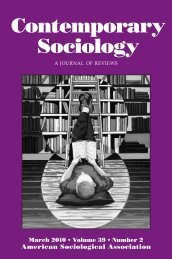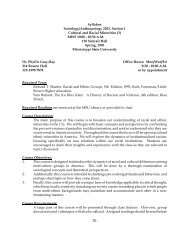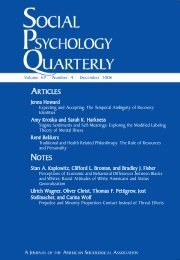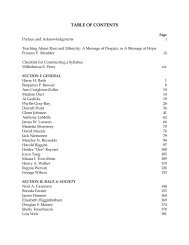3337 TS Vol36_2_APRIL 08 - American Sociological Association
3337 TS Vol36_2_APRIL 08 - American Sociological Association
3337 TS Vol36_2_APRIL 08 - American Sociological Association
Create successful ePaper yourself
Turn your PDF publications into a flip-book with our unique Google optimized e-Paper software.
100 TEACHING SOCIOLOGY<br />
Table 3. Burawoy’s Typology of <strong>Sociological</strong> Work<br />
Academic Extra-Academic<br />
Instrumental Professional Policy<br />
Reflexive Critical Public<br />
From Burawoy, Michael. 2005. “2004 Presidential Address: For Public Sociology.” <strong>American</strong> <strong>Sociological</strong><br />
Review (70)February:4-28.<br />
However, professional sociology is not<br />
without its reflexive cousin—critical sociology—which<br />
stands back and asks about<br />
those theoretical and methodological foundations<br />
as well as the research agendas that<br />
follow from them. Looking to the wellknown<br />
critics of the discipline’s isolationist<br />
past such as C. Wright Mills, Herbert<br />
Gans, and Alvin Gouldner and to the more<br />
recent streams of feminist, queer and critical<br />
race theory which also point to disciplinary<br />
narrowness, Burawoy seeks to incorporate<br />
both mainstream and alternative<br />
viewpoints within the community of sociology.<br />
Further, for Burawoy, policy sociology<br />
differs from professional sociology only in<br />
its audience. Policy sociology, often most<br />
confused with what sociologists have<br />
thought of as “public” sociology, is distinct<br />
in that clients present sociology with a problem,<br />
and practitioners of the discipline are<br />
expected to use their expertise in the service<br />
of the client-defined goal. That is, policy<br />
sociology brings the tools of sociology to<br />
solve practical problems brought to us by<br />
others. It also focuses on the evaluation of<br />
solutions that have already been put in place<br />
by governments, agencies or community<br />
groups.<br />
However important these other types of<br />
sociology are, Burawoy’s primary goal is to<br />
clarify and elaborate on what is public sociology.<br />
In fact, Burawoy’s first and critically<br />
important point is that there are many<br />
“public sociologies,” a feature with which<br />
many find agreement (e.g., Sassen 2005).<br />
He criticizes those who see public sociologists<br />
“only” as writers of Op-Ed pieces in<br />
The New York Times and other popular venues,<br />
who take on the big questions of the<br />
day, and who have been roundly “openly<br />
contemptuous” of professional sociology.<br />
This view has often confused professional<br />
sociology with a type of method, primarily<br />
quantitative, and with the philosophy of<br />
sociology as a narrow pretender to the natural<br />
sciences. In return, he criticizes those in<br />
the mainstream of professional sociology<br />
who have been skeptical, equally contemptuous,<br />
and worried that this public work is<br />
“sociology light.” Rather, Burawoy sees<br />
these bifurcations as unwise and arbitrary,<br />
noting that these public skirmishes obfuscate<br />
the fact that there often is, and should<br />
be, synergy and mutual admiration among<br />
different types of sociological work. Yet, he<br />
notes, as Boyer does, that only certain types<br />
of work tend to garner available rewards in<br />
higher education.<br />
It is here, in his discussion of public sociology<br />
and its connection to civil society,<br />
that Burawoy’s typology resonates importantly<br />
with the issues of teaching and learning<br />
that are at the heart of the two other<br />
perspectives presented earlier. Under his<br />
schema, students are our first, most captive,<br />
and ever present public. As he notes, “As<br />
teachers we are all potentially public sociologists”<br />
(Burawoy 2005b:9).<br />
The reception to Burawoy’s argument has<br />
been “mixed” in the U.S., “muted” in<br />
Great Britain, and often “guarded” in general<br />
(Hall 2005; Scott 2005). This perspective,<br />
like those described earlier, has not<br />
been without its critics. He has received the<br />
familiar criticism that his approach would<br />
jeopardize sociology as a “professional<br />
practice” (Holmwood 2007) and that his<br />
argument is merely a thinly veiled leftist<br />
call to “man the barricades” (Nielsen<br />
2004). Others suggest that he has not gone


